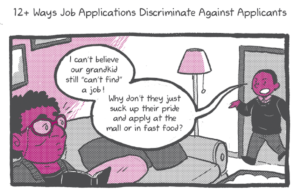Originally published on Adios Barbie and republished here with their permission.
Media’s influence is an escapable topic within the mainstream narrative of eating disorders.
Whether it’s writers like Naomi Wolf making the connection or European governments banning underweight models in an effort to combat anorexia, the cause-and-effect relationship between media and eating disorders is ever-present.
In fact, legislation related to eating disorder advocacy, such as Anna’s Law (a fantastic piece of legislation that would provide more care opportunities for millions), often includes points related to regulating media representation of bodies.
Certainly the way human bodies are portrayed through media outlets is problematic. The employment of thin, airbrushed, photo-manipulated individuals can affect viewers’ self-perception and their expectations for their own bodies.
For some, it is a trigger or contributing factor to the development of an eating disorder. Such images also promote and uphold fatphobia, fat-antagonism, ableism, cissexism, trans-antagonism, racism, and other forms of discrimination. In the fight for equality, media is an important institution to analyze, deconstruct, and change.
However, eating disorders remain some of the most misunderstood illnesses in the world, and this hyper-focus on the media can be dangerous.
Those who have been personally affected by an eating disorder, those who have supported a loved one, and those who have been educated on the subject are aware that eating disorders are complex.
But for many others, this cause-and-effect relationship is the central point of their knowledge. As such, many narratives, facts, and realities of eating disorders are moved from public knowledge.
These are just five of the realities that get erased when the mainstream conversation on eating disorders zeroes in on the media.
1. Eating Disorders Are Mental Health Issues
Eating disorders are mental health issues that develop as a result of a variety of factors, including genetics, co-occurring psychological disorders, interpersonal relationships, and social factors. (To learn more about contributing factors to eating disorders, read here.)
There are no clear-cut steps to someone developing an eating disorder. That is, while media may be a contributing factor or a trigger, it is not necessarily so, nor must it be the only one.
By focusing exclusively on the media, we simplify eating disorders into a one-dimensional problem. Worse, this media often reproduces the myth that eating disorders are a choice.
After all, if eating disorders are created through unrealistic media portrayals, then we simply have to rid ourselves from the influence of the media. Or a parent can prevent their child from developing an eating disorder by regulating their exposure to media.
It’s not hard to imagine continuing this line of thought to the conclusion that people can then overcome their eating disorder simply by choosing to eat more or less.
The fact that eating disorders are mental illnesses with many contributing factors is erased, and is instead replaced by the notion that through changing media or one’s access to it, an individual can overcome their disorder.
It’s not a matter of choosing to view different media and eat normally.
2. Everyday Interactions Have an Enormous Impact
In blaming media exclusively, individuals fail to take responsibility for their everyday actions and the impact they may have on others.
Yet many individuals who have been affected by an eating disorder recall bullying and other negative interactions as contributing factors or triggers for their eating disorders. For many, certain subjects or phrases continue to be potential triggers for relapse.
While no one is truly responsible for the development of eating disorders, it is important that the media conversation does not overshadow the need for individuals to be accountable for actions that perpetuate a fatphobic and sizeist culture.
For example, commenting on someone’s weight or size, even with seemingly good intentions, can have a profound effect. Similarly, policing someone’s eating habits can also be triggering.
Along with critiquing media outlets, individuals must evaluate their own way of talking or acting about body image.
Such self-reflection is not only useful in becoming a better person, but also in combatting fatphobia, lookism, and other forms of oppression.
3. Trauma Narratives and Eating Disorders Are Often Linked
Trauma has long been recognized as a contributing factor for many mental health illnesses, including eating disorders (in fact, it’s something I wrote about previously).
Trauma from sexual violence is the most widely recognized factor, but is not the only one. Institutional trauma, transgenerational trauma, collective trauma, and other forms of trauma are all very real and can affect one’s predisposition to developing an eating disorder.
This is evidenced by a variety of studies and narrative discussions that examine structural and historical oppression of certain identity groups, such as indigenous or trans individuals, as contributing factors to the development of eating disorders.
In hyper-focusing on media, these stories of trauma get erased.
For individuals affected by eating disorders and trauma, this means that access to care may be even more necessary, but less possible.
This media-based dialogue may make it more difficult for individuals to recognize the links between their trauma and their disordered eating.
4. The Experiences of Trans Folks are Unique and Deserve Discussion
As a cisgender woman, I have a limited understanding of the experiences of trans individuals affected by eating disorders (I would recommend reading Sam Dylan Finch on the subject). However, I do question the link between media and eating disorders in relation to trans individuals.
If individuals develop eating disorders from wanting to be like the images perpetuated through media, what does this suggest about trans individuals, especially non-binary people? It suggests that everyone exclusively identifies with and wants to present themselves within the binary.
By continuously highlighting the link between media and eating disorders without accounting for other factors, are we not then perpetuating a cissexist and transphobic conversation that reinforces gender binaries?
This is an underanalyzed form of violence within eating disorder activism.
5. The Experiences of Those Affected by Non-Restrictive Eating Disorders Are Valid
Typically, the central idea behind the link between eating disorders and media is that media creates a desire for thinness through idealizing thin individuals.
While the erasure of plus-sized and fat individuals within media is very real, this narrative further stigmatizes individuals with non-restrictive eating disorders.
Binge eating disorder has long gone unrecognized within the medical community, only gaining DSM recognition in 2013. Socially and in relation to insurance coverage, however, it continues to be misunderstood and stigmatized. Individuals tend to ascribe binge eating disorder to a lack of willpower, along with other fatphobic and fat-antagonistic notions.
In terms of the mainstream media argument, then, this decision-oriented, fatphobic perception of binge eating disorder (and other forms of non-restrictive disordered eating) is only reasserted.
If individuals develop eating disorders to conform to thinness they see in media, then binge eating disorder is erased or invalidated.
***
The relationship between media and eating disorders is certainly a valid one, within certain contexts.
The strides that various eating disorder justice organizations and individual advocates have made in making media more inclusive and responsible are laudable. But we must not let this dialogue overshadow other causes of and contributing factors to eating disorders.
More importantly, we must not let it dictate the mainstream perceptive of eating disorders, especially when it erases the real narratives of those affected.
[do_widget id=’text-101′]
Kira Rakova is an undergraduate student activist at the City College of New York studying international studies, communications, and anthropology. She is part of various community-based organizations, including the Student Mental Health Initiative, Body-positive Empowerment & Acceptance Movement (BEAM), and the Gender Resource Center Campaign. Her passions and interests include eating disorder justice, destigmatization of mental health, gender justice, and community empowerment.
Search our 3000+ articles!
Read our articles about:
Our online racial justice training
Used by hundreds of universities, non-profits, and businesses.
Click to learn more





















